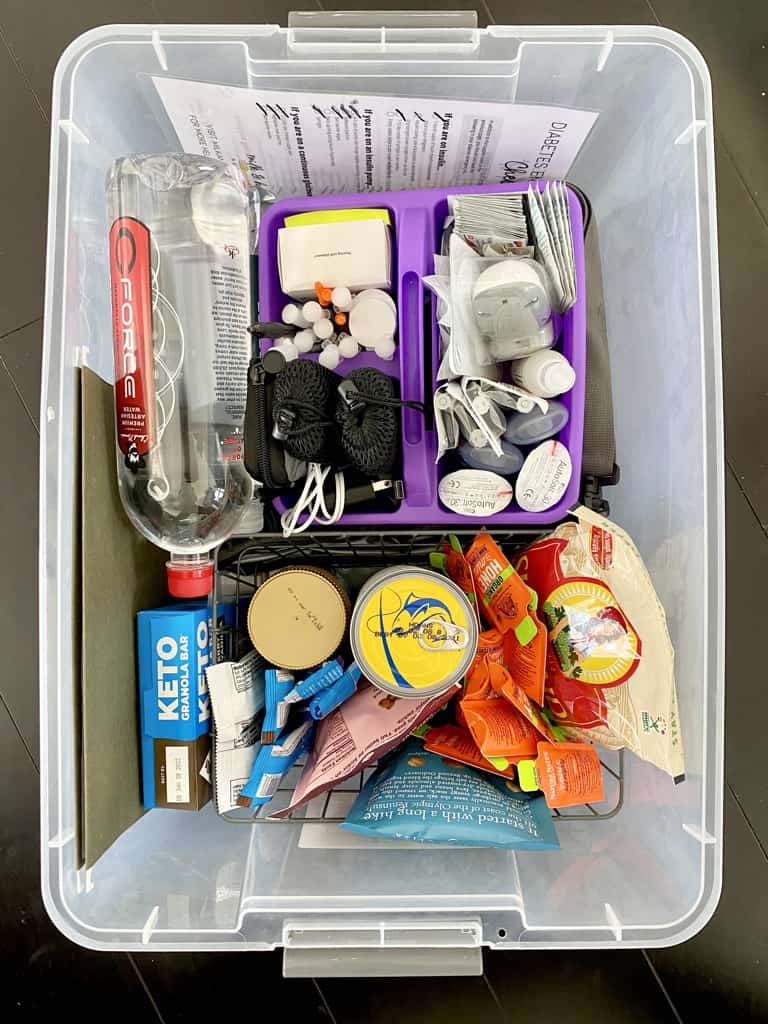
No matter where you live, there is always the possibility of a natural or man-made disaster and everyone with diabetes should have a diabetes emergency kit ready to go just in case.
Whether it’s a hurricane like we have here in Houston, or earthquakes, or a tornado, or just a bad thunderstorm that knocks the power out for a while, there’s always the potential for a disaster and you need to be prepared. A diabetes emergency kit should have everything you need to get you through 5-7 days in the event of an emergency!
5 key things to include in your diabetes emergency kit
When we’re planning our diabetes emergency kit, there’s 5 key things to account for. Further down in this article, you’ll find a more complete checklist with items for each category, and a free download of the list.
- Papers and information to have extra hard copies of in your emergency kit
- General diabetes emergency supplies
- Food
- Low and high blood sugar supplies
- Blood sugar testing supplies
Disaster preparedness and diabetes
Think about it. There’s so many parts of diabetes management that are dependent on our access to electricity, running water, and transportation (to go get new supplies when needed). So, what do we do if one or all of these things are interrupted or taken away in the event of a disaster?
It’s kind of scary to think about isn’t it?
But, that’s why having a well stocked diabetes emergency kit ready to go at all times is essential. While some natural disasters, like hurricanes, have a warning time that allow you to prepare, others don’t. Like thunderstorms, tornadoes, or earthquakes.
Having both a diabetes emergency kit and a diabetes emergency plan in place is necessary.
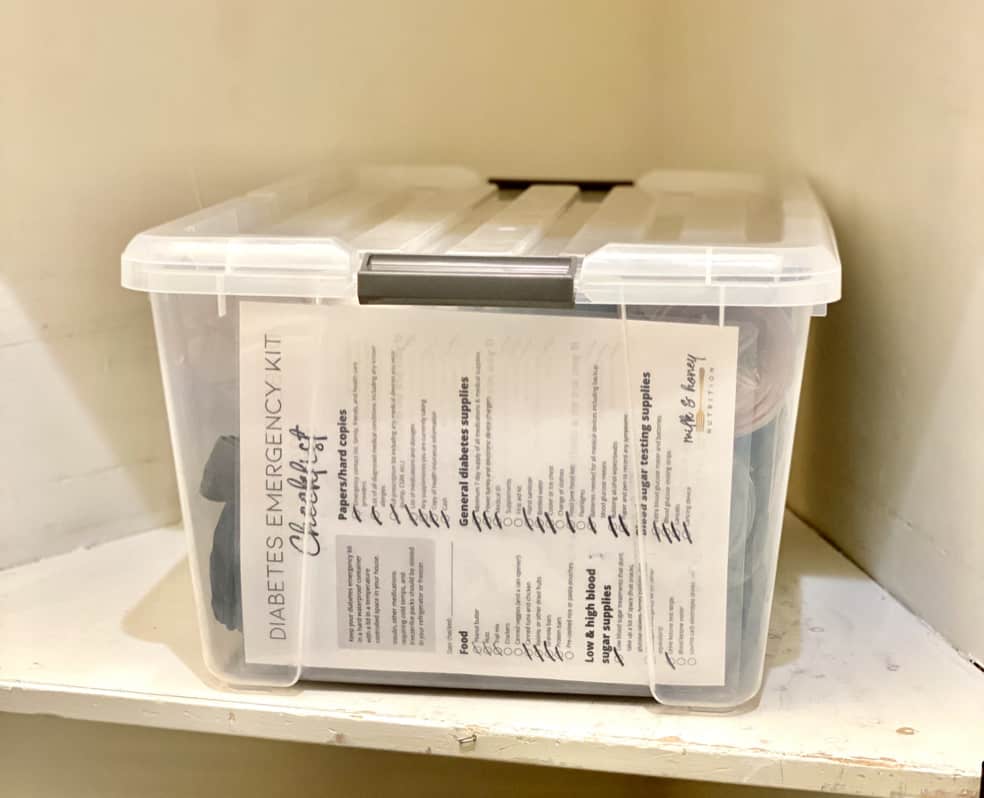
Do you have a diabetes emergency plan?
You’re probably wondering, what is the difference between an emergency kit and an emergency plan? wouldn’t that be the same thing?
Your diabetes emergency kit is everything you see in the list below (and in the photos in this post). But, you also need to have a plan in place for how you will store medications or how you will get access to supplies, or what you need to do when the power goes out.
Trust me. I’ve lived through enough hurricanes to last me a lifetime and I’m only 34. Having a plan and a well stocked diabetes emergency kit provides huge peace of mind for everyone.
Hurricane food for diabetes
You’ll see a whole section in my emergency kit recommendations for food. A lot of people forget about having these foods on hand and tend to only think of diabetes medical supplies. We all know food is crucial for managing diabetes as well!
Is there a difference between a type 1 diabetes emergency kit and type 2 diabetes emergency kit?
What you need to pack in your diabetes emergency kit will depend on what types of medication you are on. And, also if you wear an insulin pump or a continuous glucose monitor. The type of diabetes you have doesn’t really change what will be in your kit.
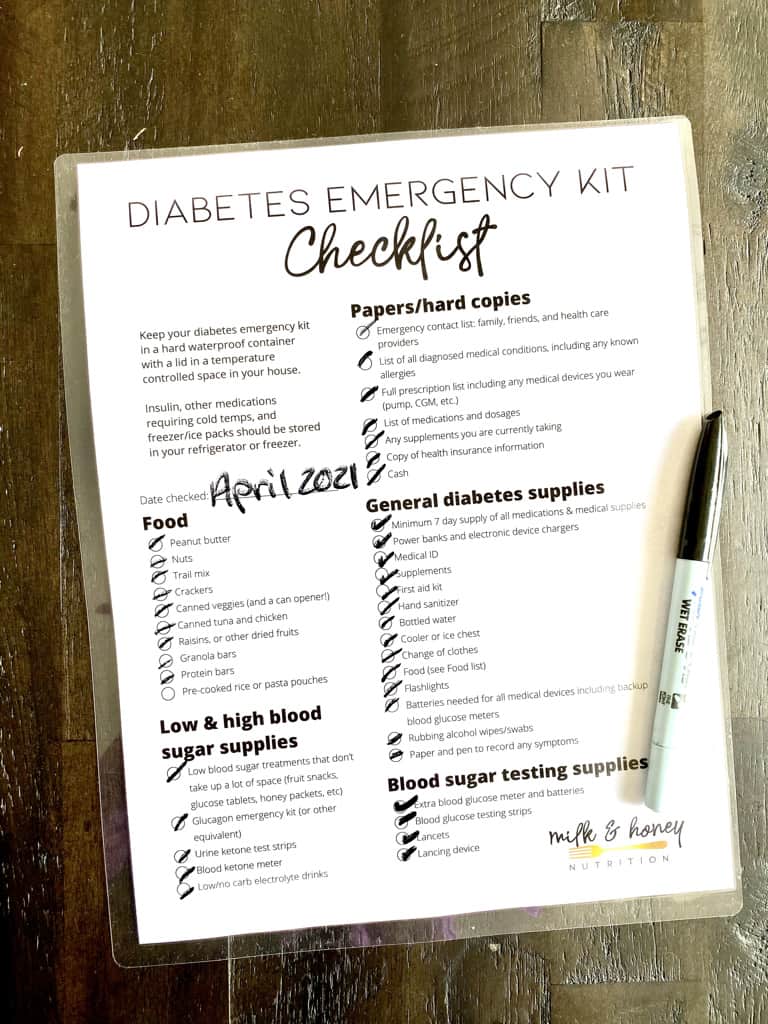
Diabetes emergency checklist
Store all of the items below in a hard container with a lid in a temperature controlled space in your house. The items below are specific to diabetes and do not include general disaster preparedness recommendations.
I keep mine in a closet that is in the center of our house, and right across the hall from the small bathroom that is our “tornado room.” I can grab it really quickly at any time.
Insulin, other medications requiring cold temps, and freezer/ice packs should be stored in your refrigerator or freezer.
Check your diabetes emergency kit every 6 months for expiration dates and to make sure it is fully stocked.
- Papers and information to have extra hard copies of in your emergency kit
- Emergency contact list: family, friends, and health care providers
- List of all diagnosed medical conditions, including any known allergies
- Full prescription list including any medical devices you wear (pump, CGM, etc.)
- List of medications and dosages
- Any supplements you are currently taking
- Copy of health insurance information
- Cash
- General supplies
- Minimum 7 day supply of all medications and medical supplies
- Power banks and electronic device chargers
- Medical ID
- Supplements
- First aid kit
- Hand sanitizer
- Bottled water
- Cooler or ice chest
- Change of clothes
- Food (see list below)
- Flashlights
- Batteries (AAA and AA)
- Rubbing alcohol wipes/swabs
- Paper and pen to record any symptoms
- Food
- Peanut butter
- Nuts
- Trail mix
- Crackers
- Canned veggies (and a can opener!)
- Canned tuna and chicken
- Raisins, or other dried fruits
- Granola bars
- Protein bars
- Pre-cooked rice or pasta pouches
- Low and high blood sugar supplies
- Low blood sugar treatments that don’t take up a lot of space (fruit snacks, glucose tablets, honey packets, etc)
- Glucagon emergency kit (or other equivalent)
- Urine ketone test strips
- Blood ketone meter
- Low/no carb electrolyte drinks (I like Gatorade Zero)
- Blood sugar testing supplies
- Extra blood glucose meter and batteries
- Blood glucose testing strips
- Lancets
In addition to the supplies listed above, you should also have the following in your diabetes emergency kit…
- If you are on insulin
- 1 month supply of insulin stored in a separate/safe place in your refrigerator
- Insulin cooling case and ice packs to use in the event of prolonged power outages (never use dry ice)
- 7-10 day supply of syringes or pen needles
- Empty plastic bottle to store used needles/sharps
- If on an insulin pump
- 4-5 sets of pump site change supplies (assuming you change your site every 3 days)
- Adhesive patches
- Skin barrier wipes
- Back up long acting insulin if pump fails
- Syringes
- If you wear a CGM
- 2 CGM site change supply sets
- Adhesive over patches
- Skin barrier wipes
Diabetes emergency checklist download
Download the above list in a simple one page resource. I recommend laminating it and using a dry erase marker to go through the checklist 1-2x/year.
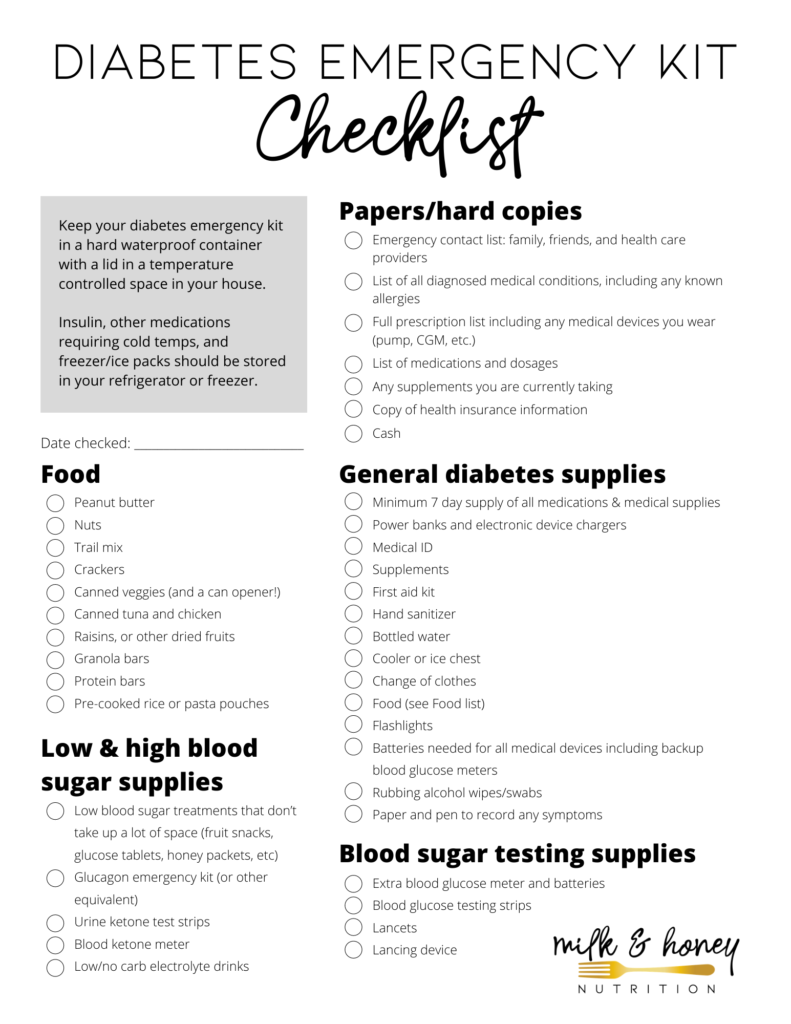
Additional diabetes disaster kit and information resources
It’s very helpful to read more than one resource when building your emergency plan and kit. I highly recommend you check out other resources, like the CDC, American Diabetes Association, and the Association of Diabetes Care and Education Specialists.





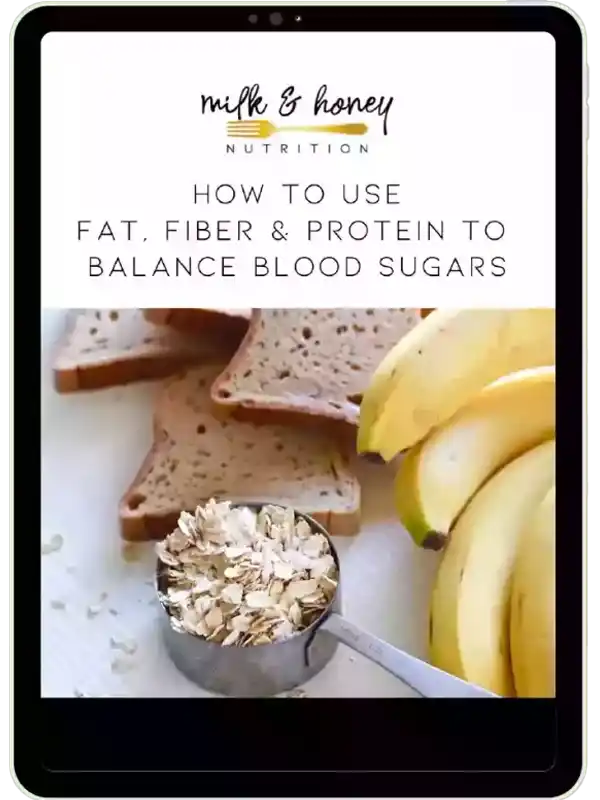
2 Responses
Thanks!! This is awesome info, I live in Florida!
Great list to help keep me organized (I’ve had T1D for 40+ years, but was recently diagnosed with MS, so now I have MORE meds/injections to worry about).
Question, though ….. I live in CA, so you know, earthquakes and wild fires. Let’s say I’ve gone into San Francisco to see a play, I always carry a small emergency supply in a rather large purse, but what if The Big One hits while I’m away from home?? This always worries me when I travel more than 10 miles from home. Do I keep a separate kit fully stocked in my car? What if I took BART into SF and can’t get home? ??? Aaagh! It makes my brain hurt! Any suggestions?